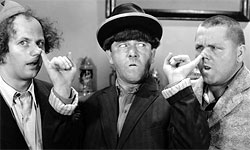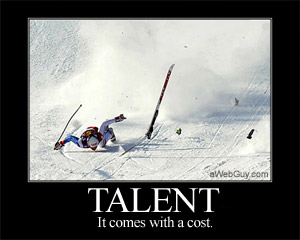
Question One: When you think of your marketing, do you think of having your name everywhere so that people will buy more of what you offer, or do you think of how nice it will feel to have a more secure business? (NOTE: They may go hand in hand, but the result is what you are after … not the cause.)
Question Two: Do you think of the money you earn, or do you think about the great neighborhood you live in, or hope to live in one day? (NOTE: Money alone is not a good result … What you do with it is another story.)
Question Three: Do you think of the fancy possessions and the great fortune you will amass, or do you think of the feelings those things will give you? (NOTE: Wanting something without a reason is no better than not wanting it at all.)
Question Four: Do you think of the things you want, or do you think of why you want them and how it will give you opportunities that you do not have today? (NOTE: I suspect there is a hint of what you really want in this question.)
Question Five: Do you really think you have a good idea of why people do business with you, or do you project your own opinions onto them in hopes it will work? (NOTE: If there is some doubt, you may want to consider what happens if you are wrong.)
There will be two categories of answers here, and one creates success, while the other will leave you disappointed. One is visionary, addresses emotions, and overcomes fears. The other will keep you where you are, with what you’ve got. It may shock you to find that you often use logic to override your own good decisions because of fear. The way logic and emotion relate in your life will have a lot to do with success or failure in how you see your business and it is reflected in your marketing.
I see it all the time that scared people do not make successful decisions in their business and in their marketing. On the other side, I find that the people with balls the size of Volkswagens and who can overcome their fear are taking success to a whole new plane. This is reflected in USA, where there was a 16 percent increase in the number of millionaires in 2009 (yes, during recession) and a 17 percent growth in households with a net worth of $5 million or more. This came following a major decline in 2008, and is a high-level look at how recession separated the fearful from the courageous.
I wrote about this on December 24th 2008 in an article titled “Recession Marketing: Choosing Logic Over Emotion” which discusses overcoming fear by using logic to divert bad decisions.
Do You Want Steak or Do you Want Sizzle?
In sales and marketing, the topic of emotion vs. logic has often been referred to as selling the sizzle and not the steak. The steak is an object. The steak represents the simple logic that people must eat to stay alive. The sizzle is an exciting representation of how that steak smells, tastes, and how satisfying it will be to sink your teeth in and enjoy.
If you want steak and the logic it represents, you are seeking the wrong thing. If you find that you want sizzle, and the things that come along with that steak, you are on a lot better path to getting things right, and getting what you want.
The list of questions and analogies can go on forever. Whatever your answers, I can tell you that success in marketing is strongly based in emotion and not logic. People do not choose their careers with an emphasis on logic, and when they do, they often end up making a career change when they realize it does not make them happy. People do not make purchasing decisions based solely on logic, either. They try very hard, but if there is an awkward feeling along with the purchase, they are gone and not coming back.
Logic Fails in Motivating a Market … Yes, Your Market!
Logic can help people to be creative with overcoming their own fears of buying what you offer, but the logic alone is only a tool. Logic is a tool to help people make good decisions, but it actually ranks pretty low in decision making when compared to emotions … namely fear.
Do you remember the last time you went to buy a car? This is something that drives fear through the roof for a lot of people. Cars cost a lot of money, and something has to help you overcome the fear of loss. You replace the fear of loss with the huge gains you receive by driving that new car. You replace the fear of loss with the fear of not getting what you want.
You may try to use the logic that you “need” a new car, or that it will “save” you money by not breaking down as often. That is bologna and we all know it. You want that car, and the sooner you overcome the fear of all that money you lose, the sooner you can sport around in that nice smelling head-turning new car. Won’t it feel good to show it to all of your friends and family? It will be so nice that everything works just right and it is nice and clean. Wow … This new car will be great!
Just believe me for a moment when I say that emotion is what drives these decisions. Sure, you may like to deny it, but go look at your car while you think about this. Just don’t get too emotional or you may end up visiting a car salesman today!
A Drive Down Logic Street
As I drove down my street on the way home from visiting a friend this weekend, I saw a lot of interesting answers all around me. I was thinking, as I often do, about my work in the field of marketing. I thought of all those lovely homes, nice cars, and best-dressed people. I thought of what motivates them. I thought of what it means to them that they drive this or that, that their postal code is this or that, how they got there, and how emotion is what made it all possible. Emotion is what drove their decisions, and emotion is what drove the decisions of the people who helped them get there.
I arrived home and looked at my blog’s visitor statistics. It shows me that many people search the Internet seeking logic to make decisions. They search (and find me) for things like SEO hourly rates, rates for web developers, and a squillion other terms that reflect fears. This reminded me how many people get the questions all wrong. Let me put it to you this way: You cannot get the right answers if the questions are wrong!
These readers in my statistics logs are not really looking for success, but rather seeking something logical to magically tell them how to achieve success. It reminded me that the majority of people get this totally backward by trying to find logical ways to get over their fear. After all, the logic may tell them that less money involved will mean less risk. This is their fear speaking to them, and they miss the elephants walking by while they are looking at all the ants around them. Their fears are telling them to seek something that completely diverts them from what will actually give them the success they want. This is a common fear mechanism that kicks in and keeps them from seeking the scary truth of what will bring them success.
Seeking what seems safe should be what really scares people. Most people want safety, which means that most people are doing the same things. This leaves little room for anything spectacular … just average. Average does not make it very far in a competitive market.
The reality is that overcoming fear of loss by replacing it with another fear such as “what if I get this wrong”, is what will deliver you that sizzling steak. You can probably find instances of this in your own life, but I can provide logic to support this if it alleviates some fear for you.
Begging for Logic in Marketing
People come to me every day hoping to find the perfect logic that will help them to make good decisions. I often point out logic in my work, and I can quantify everything from A to Z. Read my blog for about an hour or so and you will have enough logic about marketing to last you a century. Marketing is a very mathematical and logic-oriented field, but that logic and math is only a tool. I am an uncanny good marketing guy with a lot of facts and figures to prove it. My clients want that logic to help them overcome their fears. The truth of the matter is that what they really want is the sizzle, but they are still hung up on the fears that hold them back.
Proof of Emotion in Marketing
In a recent article titled “Polarize Your Audience and Stop Making Everybody Happy“, I explained that a word I made up went kind of crazy online. The word had ZERO representation in a Google search on February 23rd. Today, just a few weeks later, the word “dubeshag” returns nearly 14,000 results (click it if you need some logical proof).
This did not happen because of logic. It happened because of emotion. I wrote something funny and people became attached to it in some small way. They passed it around, they told others, and they linked to the article.
Here is a little more proof of emotion in marketing. In the photo you see above, there is about a half million dollars worth of toys. I purchased every last one of these vehicles (and more) within about one year, but I never bought one with logic in mind. I wanted the sizzle! The same is true of the clients who afforded me the ability to buy them. They wanted the sizzle, too! Fortunately for them, and me, they discovered their real motivations and overcame their fears enough to pick up the phone and call me (at toll free *REDACTED DUE TO AGING WEBSITE*).
The question it begs is this: What fears will stand between you and the sizzle you want?



